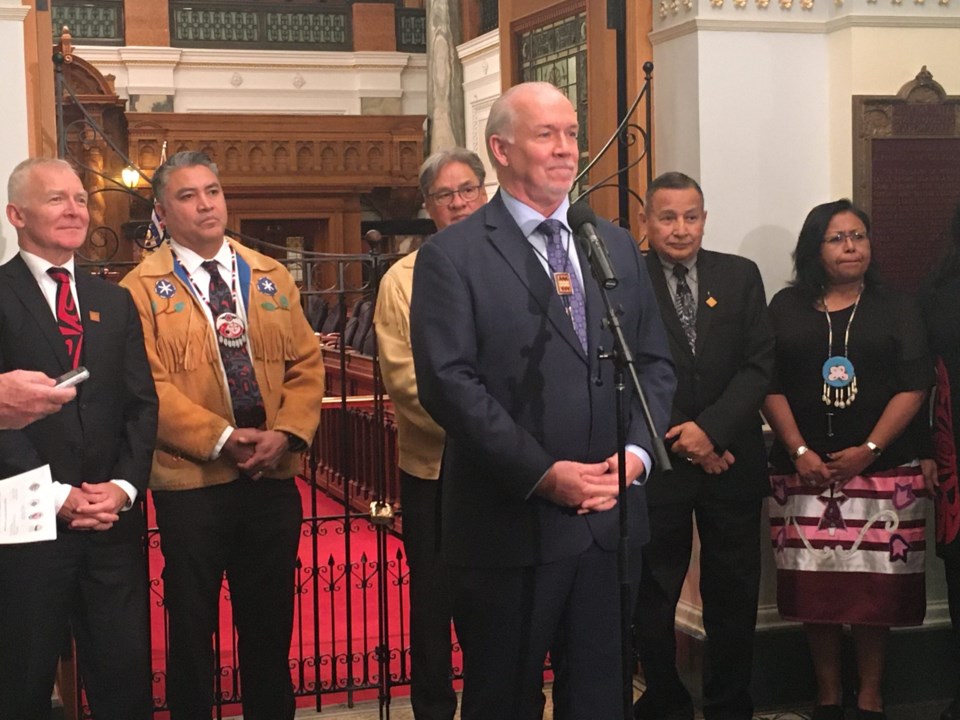The arrests of protesters blocking the Coastal Gas Link LNG project in northwestern British Columbia will hardly be the end of what has already been a years-long standoff over resource development and Indigenous Rights in British Columbia.
Further south, opponents of the Trans Mountain pipeline vowed to fight a Federal Court of Appeal ruling this week that found consultations with First Nations communities along the pipeline route were adequate, and the project approval stands.
These are the latest, but certainly not the first and not the last, of conflicts pitting resource development against Aboriginal rights in this province.
I find it startling just how successfully the federal and provincial governments have offloaded their responsibilities to First Nations onto corporate Canada. And it’s nothing short of baffling to me how willing corporate Canada appears to have been to take on the task.
Granted, both levels of government had botched the job for generations. Certainly, I can understand corporate frustration at these governments’ utter failure to offer clarity over the approvals process. They simply have not made enough – if any – progress in reconciling landmark court decisions that one after another after another have found Aboriginal title to their lands was never extinguished.
Both levels of government had botched the job for generations.
The first case was in 1973: Nisga'a chief Frank Arthur Calder v. the Attorney General of British Columbia. That’s 47 years ago. Even at a government pace, we’re well past ridiculous and far into the territory of wilfully unlawful.
Forty-seven years of watching forests logged, minerals mined, oil and gas pumped out of the ground in First Nations communities mired in poverty.
There is no excuse for the current state of chaos when it comes to land title, consent, and accommodation.
Both levels of government have eschewed their responsibilities, leaving the courts and development proponents to try and sort it out. We are, today, exactly where Canada © and British Columbia© have gotten us.
I had the privilege of working for several years on the Treaty team of the Northern Secwepemc te Qelmucw (NStQ), four Secwepemc communities in the Cariboo region of the 17 Secwepemc communities in the B.C. Interior. They have been in the B.C. treaty process for over 25 years.
There is no excuse for the current state of chaos when it comes to land title, consent, and accommodation.
It was heartening to see how much work has been done and how dedicated the NStQ and other communities are to their communities. It was staggering to see these small communities juggle the overwhelming demands of project proposals, legislative change, consultation, government policies and programs and the day-to-day needs of communities still dealing every day with the fallout of 150 years of Canada.
Most Indigenous communities, like the Wet’suwet’en, are in the process of transitioning from a colonial governance structure imposed by the Indian Act into a government that merges their traditional ways with the demands of a modern population in a modern world. It is a difficult task made all the more difficult by the interference of outside interests. Those include governments who have failed to resolve title and rights issues, corporations whose goal is to green-light development and activists who manipulate the confusion as a means to their own ends.
With its recent TMX ruling, the Federal Court of Appeal has now applied some pressure to First Nations in B.C. that they, too, must work with B.C. and Canada to find that way forward.
It is a difficult task made all the more difficult by the interference of outside interests.
Officially, there are 198 First Nations communities in British Columbia and few enough treaties that you can count them on your fingers. Each is a distinct, unique community with its own language, cultural practices, history and aspirations. There is no homogenous “First Nations” culture or belief system in British Columbia or in Canada and there is no homogenous, one-size-fits-all solution to moving forward.
Ultimately, the only resolution to these conflicts and the many to come will be found in trilateral agreements reached in good faith at a negotiation table. They may or may not be called treaties. They may or may not include sweeping self-government provisions. They probably won’t please everyone.
They will have to adapt and grow and change as the relationship between British Columbia and Canada and these Nations adapts and grows and changes.
But they are a start.
It took a long time to make such a mess. It will take time to fix it.
Dene Moore is an award-winning journalist and writer. A news editor and reporter for The Canadian Press news agency for 16 years, Moore is now a freelance journalist living in the South Cariboo. Moore’s two decades in daily journalism took her as far afield as Kandahar as a war correspondent and the Innu communities of Labrador. She has worked in newsrooms in Vancouver, Montreal, Regina, Saskatoon, St. John’s and Edmonton. She has been published in the Globe and Mail, Maclean’s magazine, the New York Times and the Toronto Star, among others. She is a Habs fan and believes this is the year.
SWIM ON:
- Last month, Dene Moore looked at forestry-dependent communities hanging on by their fingernails.
- Dallas Smith offers a unique perspective on UNDRIP, leadership, and the meaning of "consent."
- Roslyn Kunin: Finding new ways to bring fairness to Indigenous communities.



